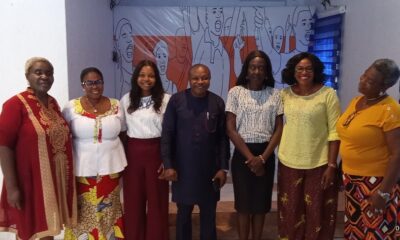Business
Appraising The Gains Of SURE-P
To some observers, the
introduction of the Subsidy Re-investment and Empowerment Programme (SURE-P) is yielding the desired results, as evident in its success story in efforts to provide critical infrastructure across the country.
Such observers claim that the programme is also striving to address some of the nation’s critical deficit in social safety nets and human development challenges within the last two years.
SURE-P was introduced in 2012 following the adjustment in the pump price of petrol from N65 to N97 because of the partial removal of the subsidy on petrol by the current administration.
Under the arrangement, N32 is being deducted from the proceeds from every litre of petrol dispensed, with the Federal Government taking 41 per cent, while 51 per cent is set aside for states and local governments and 5 per cent devoted to ecological matters.
In simple arithmetic, the Federal Government is, therefore, getting over N180 billion as its share of the subsidy funds on an annual basis.
Less than two years down the line, the Chairman of SURE-P, Gen. Martins Luther Agwai, said that the programme had spent more than N280 billion on various intervention projects since its inception in 2012.
He said that SURE-P had also rolled over about N88 billion for more projects.
“In 2013, we had over N88 billion which we rolled over into 2014.
“Our policy this year is that we would have zero budget rollover. We have already set up the machinery; we are working hard and we have restructured our operations into sub-committees.
“We have worked on the lessons we learnt in the past two years and we are primed to deliver. I want to assure Nigerians that this year, they will see remarkable changes and we will deliver our services with integrity and credibility.
“Sure-P has achieved a lot in this country. You just have to go out there and see the facts, including nearby projects such as the Abuja-Lokoja road.
“You will appreciate our input better if you know the state of the Abuja-Lokoja road before we came onboard in 2012; we hope that by the end of this year, we will know how much work has been done.
“If you go to the area of maternal health, we have also been able to upgrade 500 health centres and we are currently working on another set of 700 health centres.
“We have sunk over 620 boreholes across the country to expand the people’s access to potable water and we are also providing medications and `Mama Kits’ for expectant mothers.
“In a nutshell, we have been able to reduce maternal deaths by almost 60 per cent.
“Now, we have over half a million women giving birth under the care of trained midwives, which was not the case in the past.
“We have also asked Nigerians if there are areas where SURE-P is facing challenges or areas requiring our intervention.
“We are very open to advices since our objective is to serve Nigeria,’’ Agwai said while briefing President Goodluck Jonathan on SURE-P’s achievements recently.
He said that SURE-P was also investing over N6.3 billion on polio eradication, while spending over N450 million on the construction of a stroke centre in Abuja this year.
Similarly, Agwai said that SURE-P would spend over N13 billion on infrastructural projects in the satellite towns of the Federal Capital Territory (FCT) this year alone, in addition to over N10 billion being invested on the construction of the second Niger Bridge.
Agwai, who disclosed this at a recent Forum in Abuja, explained that the programme would execute road, electricity and water supply projects in the satellite towns.
He said that SURE-P’s intervention was geared toward improving the living conditions of the residents of the satellite towns.
“Abuja is a city that most people will like to visit and reside in but most of its satellite towns are not in a good shape.
“Our plan is to make the satellite towns to meet international standard so that the disparity between the satellite towns and the city of Abuja will not be too wide,” he said.
Besides, Agwai said that this year, SURE-P would also provide N10 billion to support the ongoing Abuja light rail project.
He said that when completed, the intra-city rail transportation project would help to reduce the transportation challenges facing FCT residents.
He said that SURE-P’s intervention in the rail project was based on the fact rail transportation constituted the priority focus of the Federal Government, adding that work had also begun on the construction of the standard gauge rail track from Abuja to Kaduna.
“We hope that by the end of this year, the rail line will be completed and we will have trains running from Kaduna to Abuja in less than two hours.
“Then, people can live in Kaduna and work in Abuja. After all, how long does it take people to come from Mararaba (Nasarawa State) to come and work in Abuja,’’ he said.
Agwai said that part of the duties of SURE-P involved the provision of critical infrastructure across the country.
“It did not stop there; government also wants SURE-P to be an instrument for development, which will have some capacity on the ground after the expiration of the administration’s tenure.
“In line with this, SURE-P works with the Project Implementation Units (PIUs) in various ministries, departments and agencies (MDAs). These PIUs are the link between us, the project and the MDAs,” he said.
To add value to SURE-P’s huge investments in roads’ construction, Agwai said that the programme was also financing the construction of the Loko-Oweto Bridge in Kogi State.
He said that the SURE-P committee was satisfied with the work so far done by the contractor.
“We have been providing billions of naira for this project and I decided to visit the site and personally see what some of the SURE-P committee members have been monitoring.
“I must say that I am satisfied with what I have seen so far; the contractor has done well and I think he has justified the funds we have so far released for the project,’’ he added.
He said that the bridge project could be completed by mid-2015 if the contraction company sustained its current pace of work on the project.
Echoing similar sentiments, Mr Anietie Effiong, the Director of Bridges in the Federal Ministry of Works, said that the project had reached 57-per-cent completion.
He said that to date, SURE-P had released N17 billion, out of the N36 billion total contract sum, to the contractor.
However, Agwai said that SURE-P would soon commence the payment of six months’ arrears of the stipends, which it owed 2,000 youths in its employ.
He conceded that the programme’s initial plan was to engage 5,000 youths, adding that it, however, ended up engaging 2,000 youths because of the challenges it encountered with regard to the 2013 budget.
Agwai said that the arrears of the youths’ stipends got accumulated because of some challenges emanating from the passage of the budget by the National Assembly.
“There was a misunderstanding of prioritising issues at the National Assembly because the money voted to take care of this category was not approved.
“Instead of a budget of over N20 billion, we ended up with our budget being merged with that of FERMA.
“In doing that, the National Assembly merged the two appropriations and gave us only N9 billion and because of that development; the N9 billion which was appropriated could not even pay the 2,000 youths who were already engaged under the Federal Government’s public works scheme.
“Government then felt that instead of progressing to the targeted 5,000 youths, we should stop and manage the 2,000 youths who were already engaged until the situation is resolved.
“There is no way we could vire money because one could be tempted to ask why we returned N88 billion in 2013 when we could not pay the youths’ stipends,’’ he added.
Besides, Agwai said that no fewer than 3,000 graduates across the country had been engaged by SURE-P under its Graduate Internship Scheme.
He said that the graduates were recruited from more than 150,000 graduates who applied for placements under the scheme from 2013 to date.
He said that the graduates were undergoing internship in different public and private organisations where they were posted to acquire on-the-job experience.
According to him, the scheme is to help Nigerian graduates to acquire skills that would make them more suitable for full employment in any sector of the economy.
Agwai said that each intern received a stipend of N30,000 per month, adding that the allowance was meant to encourage the graduates to be committed to the training.
He said that some state governments had indicated interest in the scheme, adding that Borno, Plateau, Adamawa, Gombe, Kaduna, Kogi and Enugu states were already collaborating with SURE-P in the programme.
Moreover, Agwai said that SURE-P had inaugurated a specific scheme on technical and vocational training, adding that 5,075 persons were undergoing training under the scheme across the country.
Agwai said that eight government institutions, which were renovated by SURE-P in some parts of the country, were currently being used for the scheme.
In the area of public transportation, the SURE-P had also distributed about 874 buses to about 22 transport companies in Abuja under a revolving loan arrangement, its chairman said.
It is, perhaps, against this backdrop that some Nigerians commended SURE-P, while lauding the rationale behind its establishment by the Jonathan- administration.
For instance, Mr Ima Niboro, the Managing Director of NAN, said that SURE-P had succeeded in bridging the human development deficit in the country.
Niboro, who made this observation when he received Agwai in his office recently, however, noted that many Nigerians had yet to appreciate the programme’s objectives due to inadequate public enlightenment on its activities nationwide.
“It is a massive project and only people who do not understand the economics of the subsidy quarrel about it.
“We know how the president holds SURE-P very close to his chest; we know how determined he is to ensure that the programme succeeds.
“SURE-P is not all about showing pictures; it is about how the project will impact on the citizens,” he said.
Niboro pledged NAN’s readiness to assist SURE-P in efforts to enlighten the public about its specific projects and how individuals could participate in them.
“We must let Nigerians know about the programme and its projects; we must tell them what this administration is also doing.
“The current administration is the best because the projects are there for everyone to see; Nigeria has been reformed and transformed in so many areas,’’ he stressed.
Niboro commended the management of SURE-P for choosing NAN as a starting point in its efforts to enlighten the citizenry, saying that the programme had been trying its best to tackle its challenges.
All in all, observers insist that SURE-P, in spite of its success story, should intensify efforts to educate Nigerians on the relevance of the programme in nation-building efforts, even beyond its terminal date in 2015.
Adamu writes for the News Agency of Nigeria (NAN)
Sani Adamu
Business
MWUN Backs Nigeria’s Bid For IMO’s Category C Seat
Business
Food Security: FG To Review Nigerian Agric laws
Business
Okpebholo Charges Committee To End Herders, Farmers Clash In Edo … Inaugurates Boundary Committee
-
News3 hours ago
FG Restates Commitment To Improve Rural Roads, Markets, Others
-
Sports6 hours ago
Abia Warriors, Rivers United Prepares for next season
-

 Nation3 hours ago
Nation3 hours agoNGOs Urge RSG To Prioritise Child Protection Funding
-
Rivers4 hours ago
Okrika SOLAD Charges Students On Involvement In Drugs, Others
-

 News3 hours ago
News3 hours agoStudent Loan Application Process Now Fully Digitized -NELFUND
-
News3 hours ago
Tinubu Inaugurates Institute Of Vocational Training, 100 CNG Buses In Kaduna
-
Sports5 hours ago
Ekiti Honour Contingents On National AGILE Games’ Feats
-
Business3 hours ago
MWUN Backs Nigeria’s Bid For IMO’s Category C Seat

